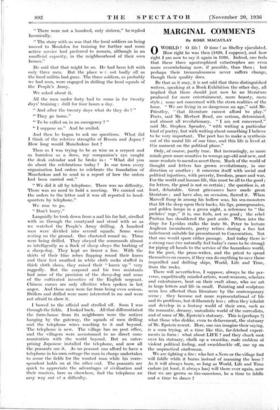MARGINAL COMMENTS
By ROSE MACAULAY OWORLD ! 0 life ! 0 time ! as Shelley ejaculated. How right he was then (1820, I suppose), and how right I am now to say it again in 1936. Indeed, one feels that these three apostrophised catastrophes are even more overwhelming now, if possible, than then ; but perhaps their tremendousness never suffers change, though their quality does.
Be that as it may, it is not odd that three distinguished writers, speaking at a Book Exhibition the other day, all implied that there should just now be no literature produced for mere entertainment, mere beauty, mere style ; none not concerned with the stern realities of the hour. " We are living in so dangerous an age," said Mr. Priestley, " that literature cannot afford to play." Poets, said Mr. Herbert Read, are serious, determined, and almost all revolutionary. " I am not concerned,". said Mr. Stephen Spender, " with writing a particular kind of poetry, but with writing about something I believe to be very important. The poet has to make a synthesis out of the moral life of our time, and this life is lived at this moment on the political plane."
Only,.of course, partly true. But increasingly, as more minds grow more sensitive to wrongs age-old and new, and more resolute to mend or avert them. Much of the world of thought and letters has grown revolutionary, in one direction or another ; it concerns itself with social and political injustices, with poverty, freedom, peace and war. For the world and human life, this must be all to the good ; for letters, the good is not so certain ; the question is, at least, debatable. Great grievances have made great literature ; and have also, on occasion, flawed it. When Marvell flung in among his hollow seas, his sea-monsters that lift the deep upon their backs, his'figs, pomegranates, and golden lamps in a green night, a reference to " the prelates' rage," it is, one feels, not so good ; the rebel Puritan has shouldered the poet aside. When into the dirge for Lycidas stalks the irate St. Peter to lecture Anglican incumbents, poetry retires during a fine hot indictment suitable for presentment to Convocation. Not that one would spare either passage. And today there is a strong case (we naturally feel today's cases to be strong) for piping all hands to the service of the hazardous world, for the poet, the prose-writer, and the priest to spend themselves on causes, if they can do anything to save those imperilled and drifting ships, World, Life and Time, from the 'rocks.
There will nevertheless, I suppose, always be the per- verse, unpolitically minded artists, word-weavers, scholars and entertainers, bent on their craft alone, who see art in large letters and life in small. Painting and sculpture seem less affected than literature by the contemporary scene ; they become not more representational of life and its problems, but deliberately less ; often they inhabit and develop in a fantasy world of their own, such as the romantic, dreamy, unrealistic world of the surrealists, and of some of Mr. Epstein's statuary. This is (perhaps ?) what those who dislike, even to defacement, the statuary of Mr. Epstein resent. Here, one can imagine their saying, is a man trying, at a time like this, far-fetched experi- ments in form : what about LIFE ? and they chuck soot over his statuary, chalk up a swastika, rude emblem of violent political feeling, and swashbuckle off, one up on the unpractical craftsman.
We are fighting a fire: who but a Nero or the village fool will fiddle while it burns instead of manning the hose ? As it will always burn, so long as World, Life and Time endure (at least, it always has) will there ever again, now that we are grown so -fire-conscious, be a time to fiddle and a' time -to dance ?




























































 Previous page
Previous page